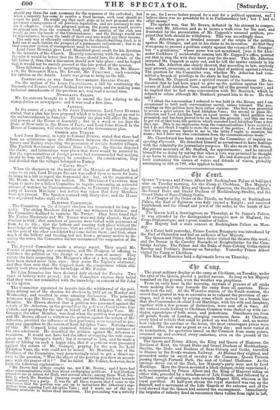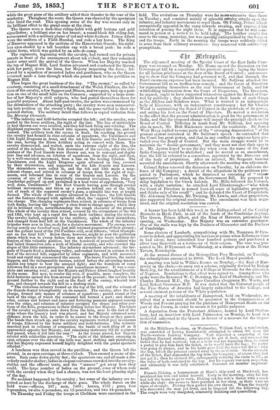C4r Camp.
The great military display at the camp at Chobham, on Tuesday, under the eyes of the Queen, proved a perfect success. So long as her Majesty remained on the ground, even the weather was propitious.
From an early hour in the morning, myriads of persons of all ranks were making their way towards the camp from all quarters. Thou- sands took the rail. At the Waterloo station of the South-western, the crowd that poured in was so excessive as to exhaust the provision of car- riages, and it was only by seizing some which arrived on a branch line that the Commander-in-chief Lord Ilardinge, with his wife and daughter, together with a few persons of distinction, were sent off in time. All the various roads leading to Chobham Common were choked up with car- riages, equestrians of both sexes, and pedestrians. Omnibuses ran from all points South of London, charging enormous fares. At Chertsey, every kind of vehicle that could be picked up was hired ; and, no matter how iicketty the carriage or the horse, the most extravagant prices were exacted. The rush was as groat as on a Derby day ; and more varied at its termination, for spectators issued on the Common from many points, swarmed up and crowned every eminence, even on the ground of the coming manoeuvres.
The Queen and Prince Albert, the King and Queen of Hanover, the Duchess of Kent, the Grand Duke and Grand Duchess of Mecklenburg- Strelitz, the Duke and Duchess of Saxe Coburg and Gotha, travelled to Staines by the South-western Railway. At Staines they alighted, and proceeded under an escort of cavalry to the Common ; Queen Victoria passing through Portnall Park, the seat of Colonel Challoner. As the carriage drove out of the Park, her Majesty's party were met by Lord Hardinge. Here the Queen mounted a black charger, richly caparisoned ; and, accompanied by Prince Albert and the King of Hanover riding on either side, preceded by a detachment of Life Guards, and followed by a brilliant cortege of carriages, rode towards Magnet Hill, whereon is the royal pavilion. At half-past eleven the royal standard was run up the flagstaff, and a movement of the Life Guards at the extreme end of the road showed that the Queen had entered the encampment. Immediately the brigades of infantry fired in succession three yollies from right to left,
while the great guns of the artillery added their thunder to the roar of the musketry. Thoughont the route the Queen was cheered by the spectators who lined the road. This opening scene of the day was second only in its brilliant effect to the grand scene at the close.
The Queen wore a dark-blue riding-habit with gold buttons and gold aiguellettes; a brilliant star on her breast; a round black felt riding-hat, surmounted with a military plume of red and white feathers. Prince Albert wore the uniform of a Field-Marshal, and rode a bay horse. The King of Hanover appeared in the uniform of the Hanoverian Guards; his sight- less eyes shaded by a tall bearskin cap with a broad peak : he rode a white horse, which was guided by an aide-de-camp.
The regiments, beginning with the cavalry, had turned out for private parade in front of the encampment about ten o'clock, and they remained under arms until the arrival of the Queen. When her Majesty reached the top of Magnet Hill, Lord Seaton advanced and conducted the Queen, with her party, down the lines, her Majesty inspecting the force ; fol- lowed by a squadron of mounted ladies and gentlemen' who as the Queen returned made a lane through which she passed back to the pavilion on Magnet Hill.
Then began the great business of the day. "The enemy," so called by courtesy, consisting of a small detachment of the Welsh Fusiliers, the far- riers of the cavalry, a few Sappers and Miners, and two guns, took up a posi- tion on one of the small hills on the Common; supported by a large num- ber of her Majesty's civil subjects, who had posted themselves there for peaceful purposes. About half-past twelve, the action was commenced by the skirmishers of the attacking party ; the cavalry were seen manreuver- jag into position on the enemy's flank, and the guns rattled to their ap- pointed station. The military detail that follows is copied verbatim from the Morning Chronicle.
"The infantry and field-batteries occupied the left ; and the cavalry, sup- ported by the horse artillery, the right of the line. The line of skirmishers at first thrown out were recalled, and they fell back firing and retiring. The Highland regiments then formed into squares, deployed into line, and ad- vanced. The artillery took the enemy in flank. On reaching the ground the cavalry had formed in close columns of squadrons, the Carabineers and 13th Light Dragoons in front, and the 1st Life Guards and the Lancers in the rear, having the Horse Artillery acting in concert with them. The cavalry dismounted, and waited, upon the extreme right of the line, the arrival of the infantry. The first movement of the cavalry, after the skir- mishers of the Foot Guards were thrown out, was to remount and deploy into line and advance, en echelon of squadrons from the right, and then, by a well-executed movement, form a line on the leading echelon. The Carabineers and the Light Dragoons again advanced in line' covered by their skirmishers, and supported by the Life Guards and Lancers. the skirmishers were called in, and the flth and 13th made a mag- nificent charge, and retired in columns of troops from the right of regi- ments, and reformed line in rear of the Guards and Lancers. On the occasion of one of these beautifully executed evolutions, the Duke of Cambridge galloped up and exclaimed in a loud voice of approbation, 'Very well done, Carabineers !' The Foot Guards having gone through several brilliant movements, and taken up a position behind one of the hills, out of reach of the supposed enemy's guns, a splendid line was at length formed. The whole of the cavalry advanced in two lines ; the Life Guards and the Lancers charged with splendid effect, the 'support' halting during the charge. The charging regiments then retired, in columns of troops from both flanks, leaving the ' support ' a clear front to charge again ; which they did in brilliant style, notwithstanding the rough character of the ground. The whole of the cavalry then retired, covered by the skirmishers of the 6th and 13th, who kept up a rapid fire from their carbines during the retreat. The cavalry, halted, supported by the artillery, called in their skirmishers, and changed front half left on the Carabineers. The whole of the infantry brigades were now in line, ready for a decisive movement. The enemy, mon- bering nearly one hundred men, had still retained possession of their ground ; and the gallant band of the 23d Fusiliers still, as at Albuera, 'stood triumph- ant on the fatal hill.' Below them however, might be seen the gathering storm which was to sweep before them not merely the brave military de- fenders of this valuable position, but the hundreds of peaceful visitors who had lulled themselves into a state of blissful security, and who crowded the slopes of this little eminence. The infantry skirmishers advanced ; the bri- gade of Guards fired a deafening volley, and rushed forward in column to the foot of the devoted hill, supported by other regiments, and with measured tread and rapid step commenced the ascent. The brave Fusiliers, the useful Sappers, and the indispensible farriers, retired before the advancing masses, unable any longer to bear the unequal fight; and the hundreds of camp followers fled in a most precipitate and tumultuous manner. It was a com- plete and amusing rout, and her Majesty and Prince Albert laughed heartily at the scene. But now, to render the rout, if possible, more complete the field-batteries opened fire from several parts of the ground; the cavalry "took ground further to the right and on the flank of the enemy, wheeled into line' and charged towards the hill in a dashing style. "The victorious infantry formed on the top of the hill, and the colours of the Guards floated triumphantly on its summit. The cavalry, after the last charge, formed into masses of columns of squadrons ; passed round at the back of the ridge of which the contested hill formed a part ; and shortly after, cuirass and helmet and lance and fluttering pennons appeared coming over the ridge, and columns of infantry occupied the elopes and other por- tions of the hills, preparatory to their defiling before her Majesty. The bands of, the cavalry regiments came down from the hills, near to the foot of the slope where the Queen's tent was placed; and her Majesty advanced some distance down the bill, in order to be nearer to the troops as they passed. The bands then struck up, and the cavalry regiments trotted past in columns of troops, followed by the horse artillery and field-batteries. The infantry marched past in columns of companies, the bands of each filing off as it approached opposite her Majesty, and remaining stationary till its regiment had passed, when it fell into the rear." As the troops passed, her Majesty saluted with soldierlike precision. "The sight of the infantry sweeping in open columns over the side of the hills was most strikin,r and picturesque, and her Majesty expressed herself highly delighted with the grand spectacle afforded."
A luncheon was then served in the pavilion; and the Queen left the ground, in an open carriage, at three o'clock. Then ensued a scene of dis- aster. Rain came down pretty fast ; the spectators one and all made a dis- orderly rushfor shelter; ladies in elegant costumes crowded into the cavalry- stables and the officers' tents, and the "masses" got away how they could. The large number of ladies on the ground, some of whom rode with the cavalry when they had a chance, was not the least pleasing sight of the day. No accident happened to the cavalry ; but some of the infantry are re- ported as hurt by the discharge of their guns. The whole forces on the field were—officers, 387; men, 7469; horses, 1757 ; guns, four 9-pounders, twelve 6-pounders, six 12-pounders, and two 24-pounders. On Thursday and Friday the troops at Ohobham were exercised in the
field. The evolutions on Thursday were far more-extensive than those on Tuesday ; and consisted mainly of splendid celitalry attacks upon the infantry, and infantry movements to repel them, OE Friday, Prince Albert unexpectedly appeared in the camp towards evening, and expressed his intention of passing the night there. It is supposed that he will com- mand, in person at a review to be held today. The heather caught fire near to the camp, yesterday, but was speedily extinguished by the Sappers and the troops. Early in the morning the troops were suddenly called to arms from their ordinary avocations : they mustered with satisfactory promptitude.



























 Previous page
Previous page